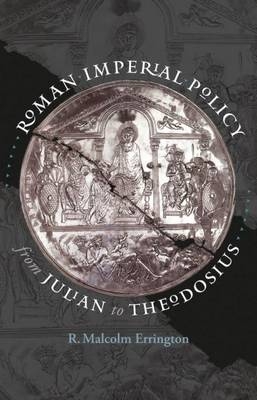
Roman Imperial Policy from Julian to Theodosius
Seiten
2006
|
New edition
The University of North Carolina Press (Verlag)
978-0-8078-3038-3 (ISBN)
The University of North Carolina Press (Verlag)
978-0-8078-3038-3 (ISBN)
- Titel ist leider vergriffen;
keine Neuauflage - Artikel merken
The division of the late Roman Empire into two theoretically cooperating parts by the brothers Valentinian and Valens in 364 deeply influenced many aspects of government in each of the divisions. This work argues that the emperors were actually much more pragmatic in their decision making than has previously been assumed.
The division of the late Roman Empire into two theoretically cooperating parts by the brothers Valentinian and Valens in 364 deeply influenced many aspects of government in each of the divisions. Although the imperial policies during this well-documented and formative period are generally understood to have been driven by the religious and ideological aims of the emperors, R. Malcolm Errington argues that the emperors were actually much more pragmatic in their decision making than has previously been assumed. The division of responsibilities between the emperors inevitably encouraged separate developments and allowed locally varying and often changing imperial attitudes toward different forms of religious belief. Errington demonstrates that the main stimulus for action in this period nearly always came from below the level of the imperial government, and not from an imperial initiative. Extending the theory of Fergus Millar into the later empire, Errington argues that the emperors were fundamentally reactive to regionally supplied information, as Millar has asserted was the case for the High Empire. Thus, despite significant structural changes, the empire remained broadly traditional in its operations.
The division of the late Roman Empire into two theoretically cooperating parts by the brothers Valentinian and Valens in 364 deeply influenced many aspects of government in each of the divisions. Although the imperial policies during this well-documented and formative period are generally understood to have been driven by the religious and ideological aims of the emperors, R. Malcolm Errington argues that the emperors were actually much more pragmatic in their decision making than has previously been assumed. The division of responsibilities between the emperors inevitably encouraged separate developments and allowed locally varying and often changing imperial attitudes toward different forms of religious belief. Errington demonstrates that the main stimulus for action in this period nearly always came from below the level of the imperial government, and not from an imperial initiative. Extending the theory of Fergus Millar into the later empire, Errington argues that the emperors were fundamentally reactive to regionally supplied information, as Millar has asserted was the case for the High Empire. Thus, despite significant structural changes, the empire remained broadly traditional in its operations.
R. Malcolm Errington is professor of ancient history at the Philipps-Universit¤t in Marburg, Germany. He is author of three other books, including A History of Macedonia.
| Reihe/Serie | Studies in the History of Greece and Rome |
|---|---|
| Verlagsort | Chapel Hill |
| Sprache | englisch |
| Maße | 156 x 235 mm |
| Gewicht | 543 g |
| Themenwelt | Geschichte ► Allgemeine Geschichte ► Vor- und Frühgeschichte |
| Geschichte ► Allgemeine Geschichte ► Altertum / Antike | |
| Geisteswissenschaften ► Geschichte ► Regional- / Ländergeschichte | |
| ISBN-10 | 0-8078-3038-0 / 0807830380 |
| ISBN-13 | 978-0-8078-3038-3 / 9780807830383 |
| Zustand | Neuware |
| Haben Sie eine Frage zum Produkt? |
Mehr entdecken
aus dem Bereich
aus dem Bereich
auf den Spuren der frühen Zivilisationen
Buch | Hardcover (2023)
C.H.Beck (Verlag)
20,00 €
Konzepte – Methoden – Theorien
Buch | Softcover (2024)
UTB (Verlag)
39,90 €
Was Pompeji über uns erzählt
Buch | Hardcover (2023)
Propyläen (Verlag)
32,00 €


